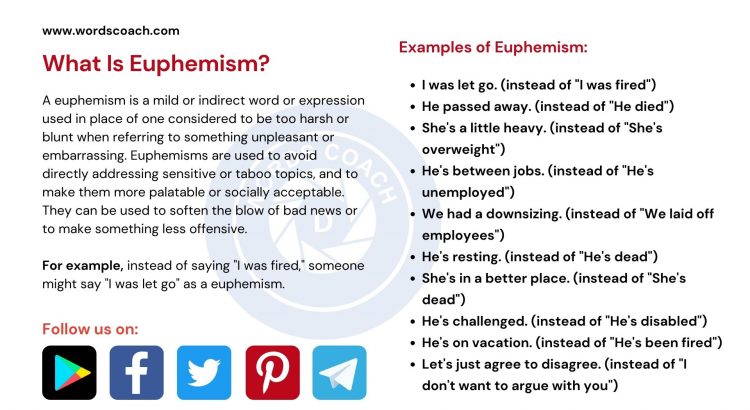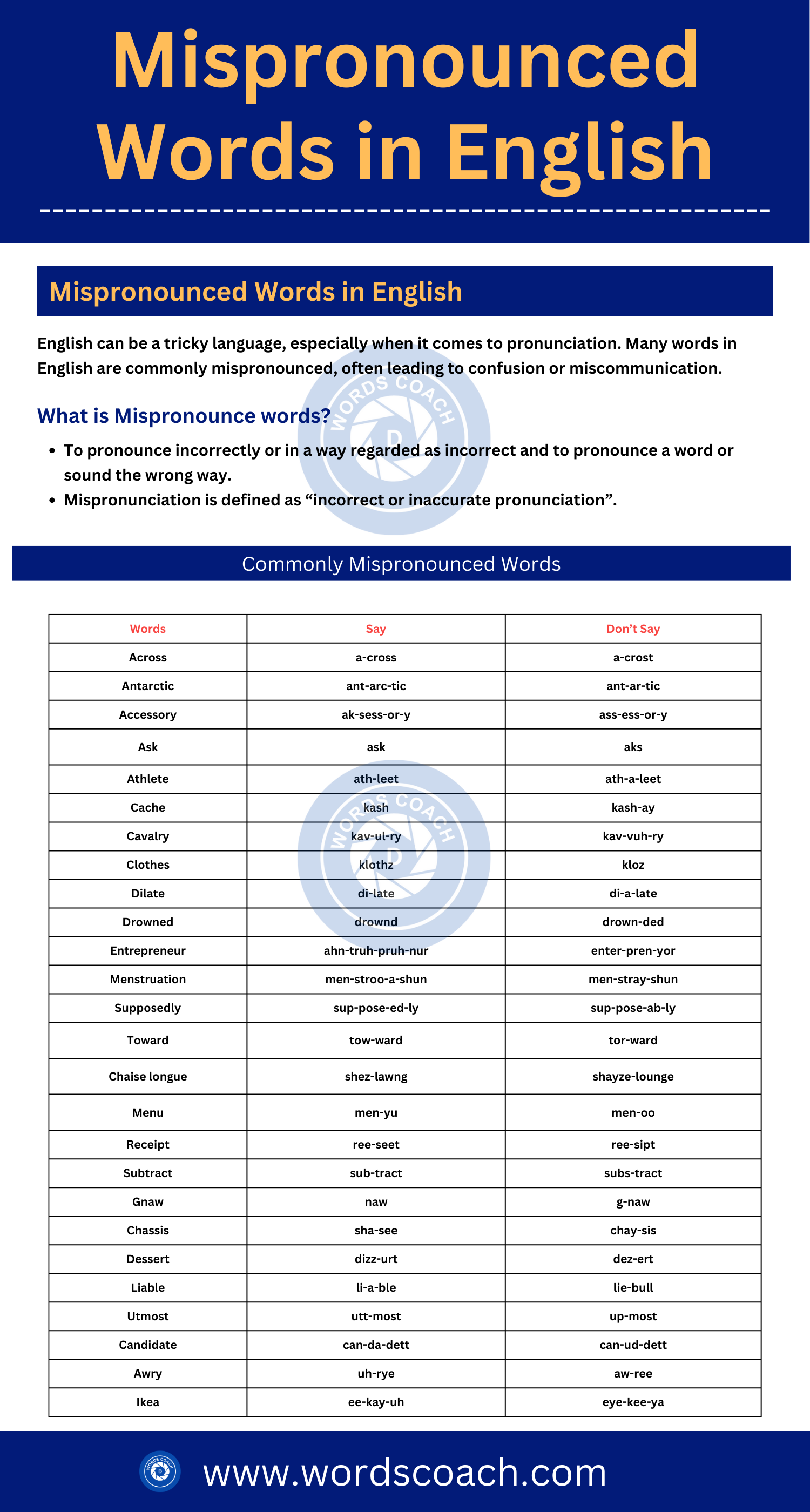What Is Euphemism?
A euphemism is a mild or indirect word or expression used in place of one considered to be too harsh or blunt when referring to something unpleasant or embarrassing. Euphemisms are used to avoid directly addressing sensitive or taboo topics, and to make them more palatable or socially acceptable. They can be used to soften the blow of bad news or to make something less offensive.
For example, instead of saying “I was fired,” someone might say “I was let go” as a euphemism.
Another example would be “passed away” instead of “died”.
Euphemisms can be found in all types of language, including everyday conversation, official statements, and advertising. They are used to create a more positive or polite image or to create a sense of political correctness.
It’s important to note that euphemisms can be used to hide the truth or to avoid responsibility. It can also be used to mislead or manipulate people.
Examples of Euphemism
Here are a few examples of euphemisms:
- I was let go. (instead of “I was fired”)
- He passed away. (instead of “He died”)
- She’s a little heavy. (instead of “She’s overweight”)
- He’s between jobs. (instead of “He’s unemployed”)
- We had a downsizing. (instead of “We laid off employees”)
- He’s resting. (instead of “He’s dead”)
- She’s in a better place. (instead of “She’s dead”)
- He’s challenged. (instead of “He’s disabled”)
- He’s on vacation. (instead of “He’s been fired”)
- Let’s just agree to disagree. (instead of “I don’t want to argue with you”)
- She’s a senior citizen. (instead of “She’s old”)
- He’s been reassigned. (instead of “He’s been demoted”)
- I’m just passing through. (instead of “I’m homeless”)
- I’m not available. (instead of “I don’t want to talk to you”)
- He’s retired. (instead of “He’s been fired”)
- She’s with child. (instead of “She’s pregnant”)
- He’s under new management. (instead of “He’s been fired”)
- It’s a personnel issue. (instead of “It’s a problem with an employee”)
- She’s a little bit pregnant. (instead of “She’s pregnant”)
- He’s taking a leave of absence. (instead of “He’s been fired”)
List of Most Commonly Used Euphemisms for Everyday Communication
| Euphemism | Meaning | Euphemism | Meaning |
| Well-to-do | Rich | Well-off | Rich |
| On the streets | Homeless | Between jobs | Unemployed |
| Bun in the oven | Pregnant | Negative cash flow | Having debts |
| Golden years | Old age | Differently-abled | Not possessing normal physical, mental and psychological abilities |
| Let one go | To fire someone | Big-boned | Fat or large |
| Curvy | Fat | Well-fed | Overweight |
| Pre-owned | Used by someone else | Lay off | To fire someone |
| Hearing-impaired | Used to refer to someone who is completely or partially deaf | Speech-impaired | Used to refer to someone who has speech-related issues |
| Telling stories | Refers to the act of lying | Tell tales | Refers to the act of gossiping or speaking about another person’s actions. |
| Lose your lunch | Vomit | Pass away | To die |
| Collateral damage | Refers to the damage done as a result of war, including deaths and injuries | Not the sharpest pencil in the box | Refer to the quality of being stupid |
| Lost one’s marbles | To refer to someone who is diagnosed/suffering from mental illness | Physically challenged | Used to refer to someone who is handicapped |
| Mentally challenged | Used to refer to someone who is partially or completely mentally abnormal | Over the hill | Used to refer to someone who is old |
| Armed intervention | Refers to a military attack | Lost someone | Used to refer to someone’s death |
| Put to sleep | Euthanise/Refers to the act of mercy killing | A bit under the weather | Used to imply that someone is sick |
| Couch potato | Used to refer to someone who is lazy | Late bloomer | Used to refer to someone who takes time to understand and learn |
| Running a little behind | To refer to being late | Outspoken | Used to refer to someone who is bossy and controlling |
| Overzealous | To refer to someone who is aggressive | Donning the fedora | Stepping out of one’s comfort zone as far as fashion is concerned |
| Adult beverages | Used to refer to liquor | Underprivileged | To refer to people who are poor |
| High-rolling | Used to refer to someone who spends money lavishly and thoughtlessly / a spendthrift | Down-and-out | Used to refer to a person who is completely out of money, has no job or a place to stay |
| A little thin on top | Used to refer to someone who is bald or going bald | To be in the bread lines | Used to refer to people who are so poor that they have to depend on food donations to survive |
| Whips and jungles | Refers to nervousness and depression | A bit down in the dumps | Used to refer to the state of being unhappy or depressed |
| To get off the deep end | Used to refer to an emotional outburst, mostly due to anger, resulting in extremely strange behaviour | Blow a fuse | Used to refer to the action of losing one’s temper |
| To blow a gasket | To become very angry | Visually impaired | Used to refer to someone who is partially or completely blind |






